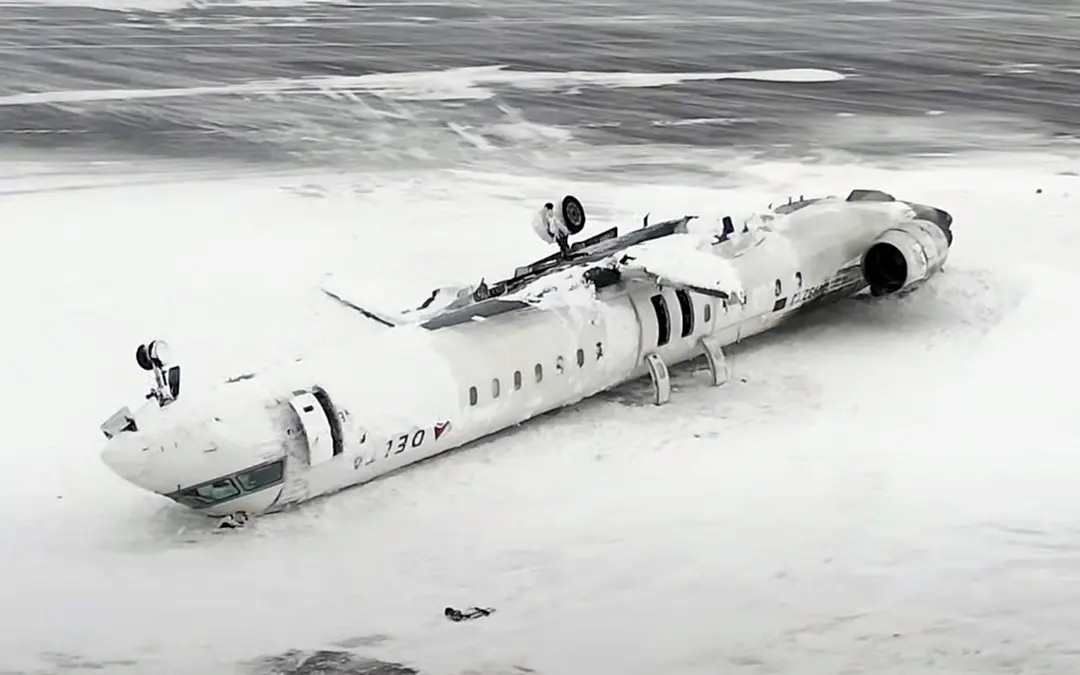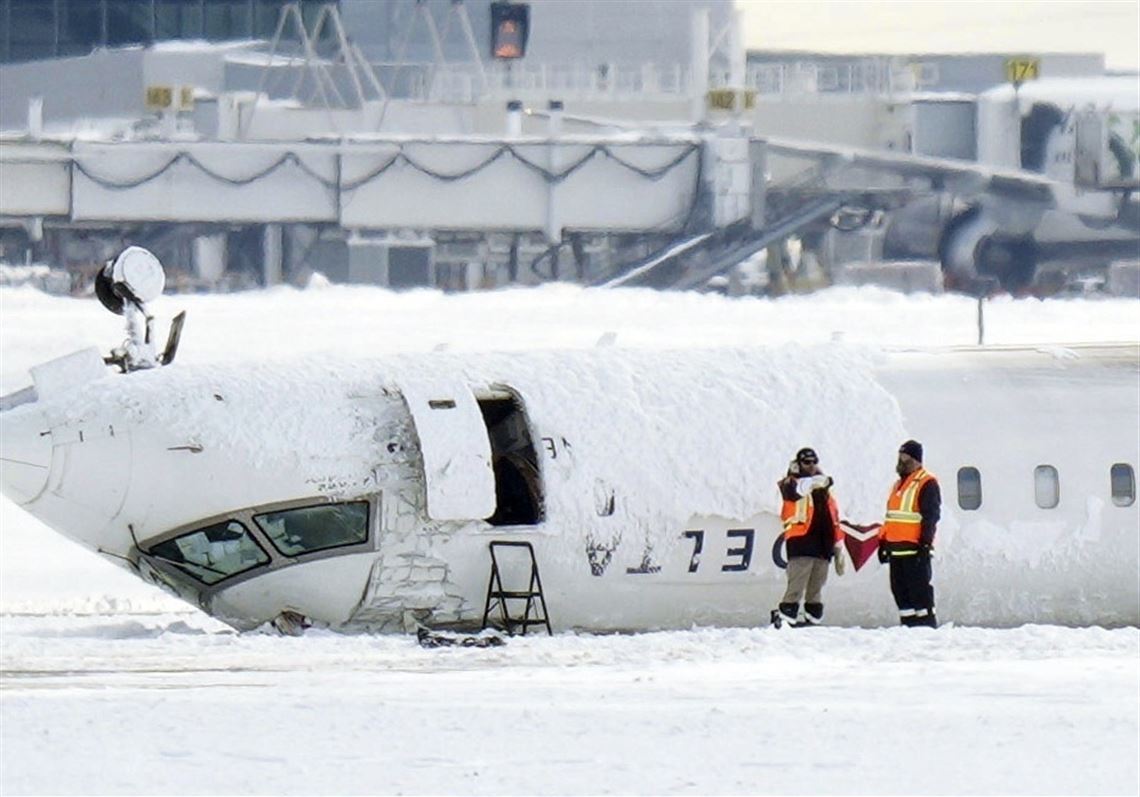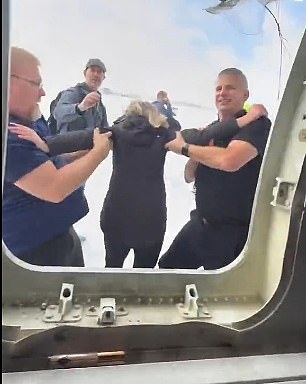In a remarkable turn of events, Delta Air Lines has announced that it will offer $30,000 in compensation to each of the 76 passengers and four crew members aboard the flight that crash-landed in Toronto on Monday. Despite the terrifying ordeal, all passengers and crew members survived, an outcome that has been attributed to the effectiveness of safety measures and the swift response of emergency personnel.
The Incident: A Harrowing Crash-Landing
On Monday, a Delta Air Lines flight traveling from Minneapolis, United States, made a crash landing at Toronto Pearson International Airport under harrowing conditions. The aircraft skidded along the icy runway in flames before flipping over and coming to a rest upside down. Video footage captured the moment as passengers scrambled to escape the overturned wreckage, stunned that they had survived such a catastrophic event.
Eyewitness accounts described the impact as “a very forceful event,” with one passenger recalling the sound of “concrete and metal scraping against each other.” Another survivor reported that passengers were left hanging upside down in their seats, disoriented but alive.
Despite the severity of the crash, most passengers were able to walk away with minor injuries. Of the 21 individuals taken to the hospital, all were released by Thursday morning.

Delta’s $30,000 Compensation Offer: No Strings Attached
In response to the incident, Delta Air Lines announced that it would provide each passenger with a $30,000 payment to assist with immediate expenses. The airline clarified that this payment does not impact passengers’ rights to seek further legal action.
Toronto-based law firm Rochon Genova has already begun representing certain passengers and their families. According to lawyer Vincent Genova, his clients suffered “serious personal injuries requiring hospital attention” and are seeking a “timely and fair resolution.”
Genova further stated that the $30,000 compensation is merely an advance payment meant to cover short-term financial burdens for passengers affected by the crash. Delta is expected to deduct this amount from any future legal settlements should passengers pursue additional claims.
This practice is not without precedent. In 2013, Asiana Airlines offered an initial $10,000 in compensation to passengers after a crash in San Francisco, while in 2023, Alaska Airlines provided $1,500 to passengers following a mid-air emergency caused by a door-plug blowout.

Investigation and Possible Causes
The cause of the crash remains under investigation, with Canada’s Transportation Safety Board (TSB) leading the effort in collaboration with U.S. aviation officials.
The plane’s cockpit voice recorder and flight data recorder were retrieved from the wreckage, and aviation experts are currently analyzing the data to determine the sequence of events that led to the accident. Preliminary expert reviews of video footage suggest that several factors may have contributed to the crash, including extreme winter weather and a rapid rate of descent upon landing.
Weather conditions on the day of the crash were particularly harsh, with reports indicating strong winds and icy runway conditions. Pilots often train for such conditions, but the severity of the landing suggests that other mechanical or human factors may have been involved.
The Crew’s Heroic Response
Delta Airlines has praised its flight crew for their quick thinking and professionalism in handling the emergency. Ed Bastian, the airline’s CEO, spoke to CBS News, stating that the crew “performed heroically, but also as expected,” given that “safety is embedded into our system.”
Passengers also commended the flight attendants and emergency responders for their efficiency in evacuating the plane. Video footage showed a flight attendant instructing passengers to leave their belongings behind and move toward the exits as quickly as possible. Despite the overturned state of the aircraft, all passengers managed to escape within minutes, an outcome credited to rigorous safety protocols and well-trained crew members.
A Pattern of Recent Air Incidents?
The Toronto crash is the fourth major aviation incident in North America in just three weeks. This unsettling frequency of accidents has raised concerns about air travel safety, though aviation experts and officials continue to reassure the public that flying remains one of the safest modes of transportation.
U.S. Secretary of Transportation Sean Duffy addressed these concerns, stating that the recent incidents are “very unique” and do not indicate a broader systemic problem in aviation safety. He emphasized that rigorous safety standards continue to protect passengers worldwide.
In a separate incident on Wednesday, just two days after the Delta crash, a small-plane collision in Arizona resulted in two fatalities, further intensifying discussions on aviation safety.
Ensuring Passenger Safety Moving Forward
The Delta Air Lines crash-landing in Toronto has once again highlighted the importance of stringent safety regulations and effective emergency response measures. While the airline has taken immediate financial steps to compensate passengers, the broader aviation community will be watching closely as investigators work to determine the exact cause of the accident.
Aviation authorities and airline companies are likely to review existing safety protocols, particularly concerning landing procedures in extreme weather conditions. The findings of the ongoing investigation could lead to new policies or adjustments to training programs to prevent similar incidents in the future.
Conclusion: A Miracle Amidst Chaos
The Toronto crash serves as a stark reminder of the unpredictability of air travel, even with modern safety advancements. For the passengers and crew aboard the ill-fated flight, surviving such a catastrophic event was nothing short of a miracle. Delta’s swift compensation offer provides immediate relief to those affected, but the long-term impact—both legally and emotionally—remains to be seen.
As aviation authorities continue to investigate, the incident underscores the critical role of well-trained flight crews, advanced safety features, and the importance of rigorous oversight in ensuring passenger safety. For now, those aboard the Delta flight can count themselves among the fortunate, having walked away from an experience that could have had a far more tragic ending.

